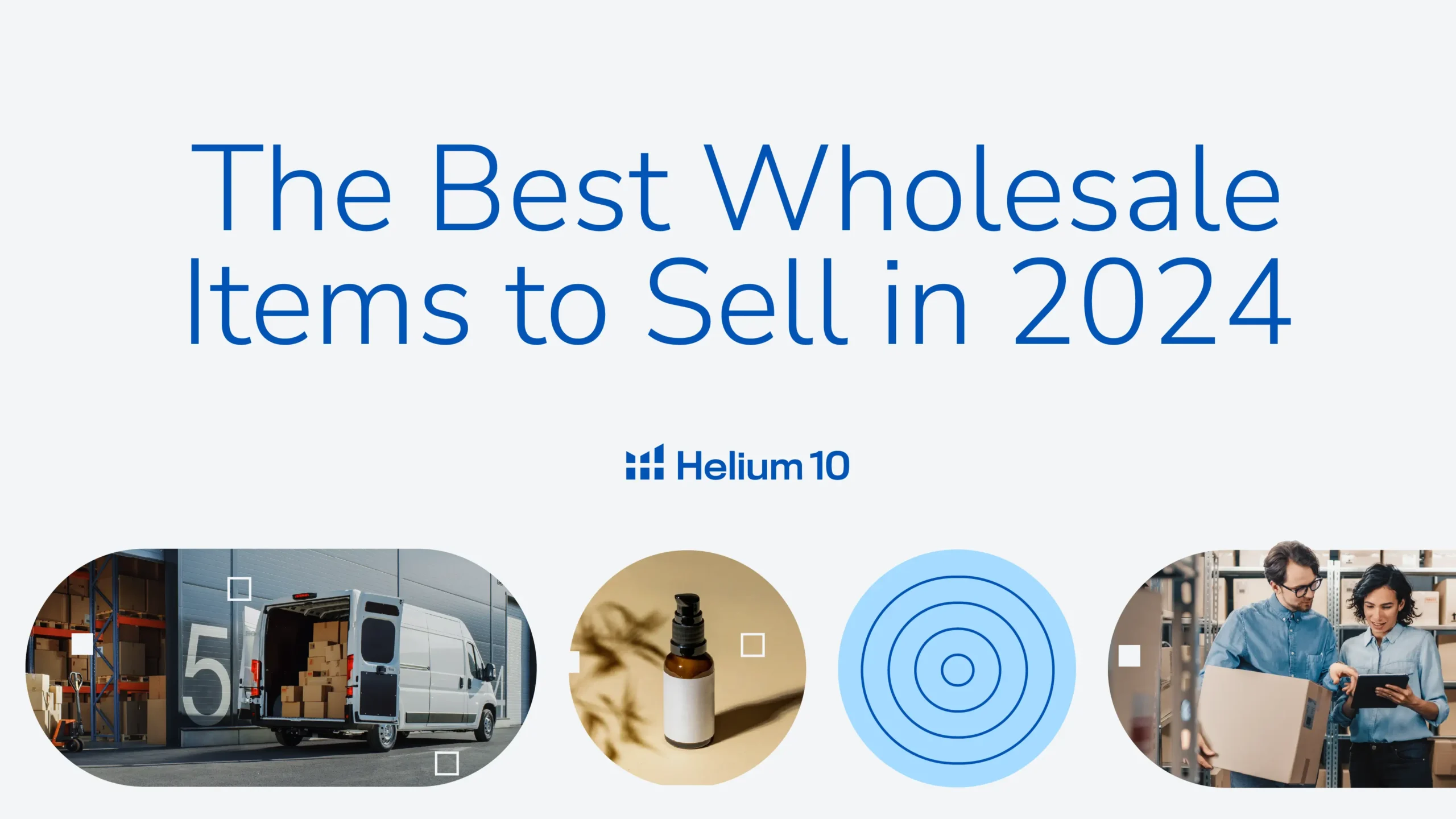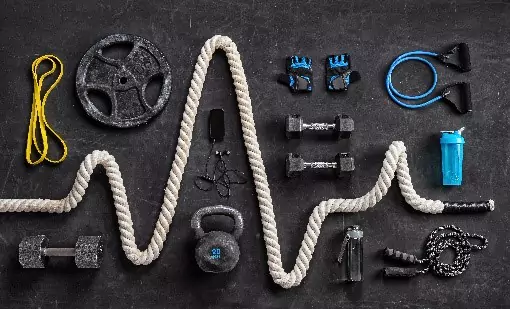
The Best Wholesale Items to Sell in 2024


Table of Contents
- How To Find Suppliers to Buy in Bulk From
- How To Find the Best Wholesale Items to Sell
- Best Wholesale Items to Sell – Examples
- Electronics Accessories
- Home Décor
- Fitness Equipment
- Personal Care Products
- Pet Supplies
- Advantages of Selling Wholesales
- Disadvantages of Selling Wholesale
- Key Takeaways
Regarding online retail and entrepreneurship, buying wholesale items to resell can be an appealing strategy for many sellers.
This approach often involves identifying popular and in-demand products with good resale potential. However, determining the “best” wholesale items to sell can depend on market trends, target audience, competition, and individual business goals.
Thorough research and understanding of the market are essential to making informed decisions and optimizing success in selling wholesale items online.
Our experts at Helium 10 have crafted an in-depth guide on how to sell wholesale items effectively and what products are best to sell.

Outclass Your Competitors
Achieve More Results in Less Time
Maximize your results and drive success faster with Helium 10’s full suite of Amazon and Walmart solutions.
Sign Up for Free
How To Find Suppliers to Buy in Bulk From
Finding online suppliers to buy in bulk from requires careful research and evaluation. Here are some steps to help you find reliable online suppliers for bulk purchasing:
- Define Your Product Requirements: Clearly define the specific products you want to buy in bulk. Consider factors such as product type, quality standards, pricing, and how large a potential audience that product may garner.
- Use Search Engines: Search engines like Google can help you find potential online suppliers. Enter relevant keywords related to your product and include terms like “wholesale,” “bulk buy,” or “supplier” to refine the results.
- Browse Online Marketplaces: Explore popular online marketplaces such as Alibaba, Amazon, or eBay. These platforms connect buyers with suppliers worldwide and offer various products.
- Check Industry-Specific Directories: Look for industry-specific directories or platforms that cater to your niche. These directories often have curated lists of suppliers and can help you find specialized products.
- Supplier Directories: Utilize supplier directories like ThomasNet or Global Sources. These directories provide comprehensive lists of suppliers across various industries, making it easier to find potential suppliers.
- Social Media Platforms: Explore social media platforms like LinkedIn, Facebook Groups, or industry-specific forums. Join relevant groups or communities where suppliers and buyers interact. Engage in discussions, ask for recommendations, and connect with potential suppliers.
- Evaluate Suppliers: Thoroughly evaluate potential suppliers by checking their websites, reading customer reviews and testimonials, and assessing their reputation. Look for transparent pricing, clear product information, reliable customer support, and secure payment options.
- Request Samples and Communicate: Before placing a large bulk order, request samples from potential suppliers to assess product quality. Communicate with suppliers to discuss pricing, shipping terms, minimum order quantities, and any other requirements specific to your business.
How To Find the Best Wholesale Items to Sell
When searching for the best wholesale items to sell on online B2B sites, consider the following criteria:
- Identify Target Market: Determine your niche and target audience. Consider their preferences, needs, and the market trends in that specific industry.
- Research Market Demand: Conduct market research to identify popular products in your target market. Look for items with consistent demand and growth potential.
- Source Reliable Wholesalers: Research and identify reputable wholesalers or suppliers that offer the products you’re interested in. Look for wholesalers with good reviews, competitive prices, and quality products.
- Evaluate Product Quality: Request samples from potential wholesalers to assess the quality of the products. This step is crucial to ensuring you sell items that meet your customers’ expectations.
- Analyze Pricing and Profit Margins: Consider the wholesale prices, shipping costs, and other expenses associated with selling the products. Calculate potential profit margins to ensure they align with your business goals.
- Assess Competition: Research your competitors to understand their pricing, product offerings, and marketing strategies. Look for gaps or opportunities where you can differentiate your business and offer unique value.
- Consider Market Saturation: Evaluate the level of competition and market saturation for the products you’re considering. If the market is highly saturated, it may be challenging to stand out unless you bring a unique selling proposition.
- Test the Market: Start with a smaller order quantity to test market demand and customer response. This will allow you to validate the viability of selling the products before committing to larger orders.
- Monitor Sales and Adapt: Track the performance of your products and make data-driven decisions. Adjust your product selection, pricing, or marketing strategies based on customer feedback and sales trends.
- Continuously Research and Expand: Stay updated on industry trends, consumer preferences, and emerging products. Regularly research and explore new wholesale opportunities to expand your product offerings.
Best Wholesale Items to Sell – Examples
With so many wholesale items available, determining which product categories will sell well can often take time and effort.
Below are some reliable product choices to give prospective wholesalers a low-risk starting point:
Electronics Accessories

- High Market Demand: Electronics accessories are in constant demand due to the popularity of smartphones and other electronic devices.
- Profit Margin Potential: These items can be sourced at relatively low wholesale prices and sold at a higher retail price, offering a good profit margin.
- Easy to Ship: Electronic accessories are generally lightweight and compact, making shipping cost-effective.
Home Décor

- Broad Customer Base: Home decor appeals to a wide range of customers, from homeowners to renters, and allows for targeting different interior design preferences.
- Seasonally Resilient: Home decor items have year-round demand, with some seasonal spikes during holidays or special occasions.
- Visual Appeal for Online Sales: Home decor products can be showcased effectively through high-quality product images, enhancing their online marketability.
Fitness Equipment

- Growing Market: The fitness industry has experienced significant growth, with an increasing number of individuals prioritizing health and fitness.
- Niche Targeting: Fitness equipment can cater to specific fitness niches, such as yoga, strength training, or rehabilitation, allowing for targeted marketing and customer segmentation.
- Repeat Purchases: Fitness enthusiasts often upgrade or replace their equipment, leading to potential repeat sales and customer loyalty.
Personal Care Products

- Trending Market: The demand for natural, organic, and sustainable personal care products is rising, driven by consumer awareness and preferences.
- Repeat Purchases and Brand Loyalty: Many personal care products are used regularly, leading to repeat purchases, and customers often develop brand loyalty once they find products that work for them.
- Social Media Engagement: Personal care products lend themselves well to social media marketing, as influencers and customers are often eager to share skincare and haircare routines, contributing to product visibility.
Pet Supplies

- Growing Pet Ownership: Pet ownership is increasing, with owners willing to invest in pet supplies to ensure their pets’ comfort and well-being.
- Niche Targeting: Pet supplies can be tailored to specific pets, such as dogs, cats, birds, or reptiles, allowing for targeted marketing and niche positioning.
- Recurring Purchases: Pet supplies, such as food and grooming products, require regular replenishment, leading to repeat sales and customer retention.
For more information about what products are selling the best on Amazon specifically, read our guide on the top 25 best-selling products on Amazon.
Advantages of Selling Wholesales
Selling wholesale can boost the effectiveness of almost any business. Here are some key advantages:
- Cost Efficiency: Purchasing products in bulk from wholesalers often allows for discounted prices, improving profit margins. Buying in larger quantities reduces per-unit costs, lowering the overall cost of goods and increasing profitability.
- Wide Product Selection: Working with wholesalers gives you access to various products from different manufacturers or suppliers. This allows sellers to offer customers a diverse selection of products, catering to various preferences and increasing chances of meeting customer expectations.
- Scalability: Selling online wholesales provides the opportunity for scalability. As you establish relationships with reliable wholesalers, you can gradually increase your order quantities to meet growing demand. This scalability allows your business to expand without significant infrastructure or production investments.
- Reduced Inventory Management: Instead of individually sourcing products from multiple suppliers, purchasing bulk from wholesalers can streamline inventory management. Sellers can consolidate orders, receive larger shipments, and reduce the time and effort spent managing individual product sources.
- Competitive Pricing: Buying at wholesale prices enables sellers to offer competitive pricing to customers. This can attract more buyers and help sellers stand out in a crowded online marketplace.
- Faster Time-to-Market: With pre-existing inventory from wholesalers, sellers can quickly list and sell products without requiring long production lead times. This allows sellers to respond swiftly to market trends and customer demands.
- Focus on Marketing and Sales: By minimizing the time spent on production and sourcing individual products, you can allocate more resources to marketing and sales efforts. This can help you build brand awareness, drive customer acquisition, and enhance your business growth.
- Flexibility and Adaptability: Working with wholesalers provides flexibility to adjust product offerings based on market demand and customer feedback. Sellers can quickly respond to changing trends and preferences by sourcing different products from wholesalers.
- Reduced Holding Risk: Buying bulk from wholesalers reduces the risk of holding excess inventory. Sellers have greater control over inventory levels, minimizing the chances of being stuck with holding costs for unsold products.
- Streamlined Supplier Relationships: Establishing relationships with reliable wholesalers can lead to long-term partnerships. As trust and rapport are built, sellers may gain access to exclusive deals, personalized support, and preferential pricing.
Disadvantages of Selling Wholesale
While selling online wholesales offers numerous advantages, it’s important to be aware of potential disadvantages and take steps to mitigate them.
Here are some common disadvantages and strategies to address them:
- Higher Initial Investment: Purchasing products in bulk requires a higher initial investment than buying individual items. This can be offset by conducting thorough market research and financial planning to ensure you have sufficient capital to invest.
- Inventory Management Challenges: Managing a large inventory can be complex and time-consuming. Resolve this by implementing efficient inventory management systems and software to track stock levels, monitor sales trends, and automate reordering processes.
- Risk of Unsold Inventory: Selling wholesale involves buying products in larger quantities, increasing the risk of unsold inventory. It’s important to conduct market research to identify products with high demand and ensure you clearly understand your target audience.
- Intense Competition: Online marketplaces can be highly competitive, with many sellers offering similar products. It’s important to differentiate your products through unique branding, packaging, or value-added services.
- Dependence on Suppliers: A business’s success relies on the reliability and quality of its suppliers. Thoroughly vet suppliers before entering partnerships. Research their reputation, reviews, and track record.
- Shipping and Logistics Challenges: Managing the logistics of large bulk shipments can be complex, especially if you’re dealing with multiple suppliers. To streamline the shipping and handling process, collaborate with reliable shipping partners or fulfillment centers.
- Limited Control Over Product Availability: Relying on wholesalers means you have limited control over product availability and stockouts. It’s important to maintain open lines of communication with suppliers to stay informed about product availability and any potential supply chain disruptions.
- Brand Dilution: Selling products from various wholesalers may dilute your identity and make establishing a unique brand image harder. To fix this, develop a brand strategy that aligns with your target market. Curate your product selection carefully, enabling consistency in quality and brand values.
- Price Competition: Selling wholesale products can lead to competition with other sellers. Focus on value rather than solely competing on price. Highlight the unique features, benefits, or added services you offer.
- Customer Service Challenges: Handling customer inquiries, returns, and support for many products can be demanding. Invest in customer service infrastructure and provide clear and accessible channels for customer support.
Key Takeaways
Here are some key takeaways from the advantages and disadvantages of using online wholesalers:
- Selling online wholesales allows for cost efficiency through bulk purchasing and discounted prices, enabling you to offer competitive pricing to attract customers.
- Working with wholesalers provides access to a diverse range of products from various suppliers, offering a selection to meet customer preferences. Sourcing different products also allows flexibility in adapting to market trends.
- Selling online wholesales offers scalability as you can gradually increase order quantities to meet growing demand. It also reduces risk by minimizing inventory management challenges and the chances of being stuck with unsold products.
- Establishing partnerships with reliable wholesalers leads to long-term relationships, preferential pricing, and personalized support. However, to mitigate dependence, careful supplier vetting and diversification are required.
- Managing shipping and logistics for bulk shipments requires collaboration with reliable partners and negotiating favorable terms. Investing in customer service infrastructure is crucial to efficiently handling inquiries and providing support.
- A clear brand strategy is essential to differentiate your business in a competitive marketplace. Curating your product selection, creating unique value propositions, and helping excellent customer experiences strengthen your brand identity.
Frequently Asked Questions
Achieve More Results in Less Time
Accelerate the Growth of Your Business, Brand or Agency
Maximize your results and drive success faster with Helium 10’s full suite of Amazon and Walmart solutions.

